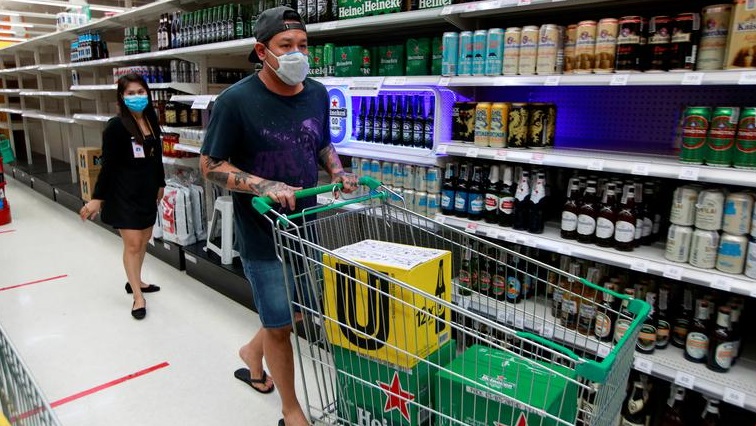The Southern African Alcohol Policy Alliance (Saapa) has called for daily liquor sales to be restricted to 6pm over the Easter holidays to slow down the spread of the coronavirus.
The call comes amid warnings by health experts that the country is likely to face the third wave in the aftermath of Easter celebrations and relaxed lockdown regulations.
Saapa Director Maurice Smithers has stressed that the Easter break is a potential catalyst for the third wave of COVID-19.
“We would really like us to look ahead and say, how can we slow down potential problems and avoid having to implement a ban because we don’t think bans are necessarily the best solutions? What we really want is to manage how people drink, not to stop them from drinking. People are talking about the third wave, winter and now, we know we are heading to the Easter weekend. What we are saying is try to get some sort of control on how to avoid alcohol from getting into becoming some kind of super spreader and seeing the numbers going up.”
‘Shotgun approach’
Meanwhile, the National Liquor Traders Council National Convener, Lucky Ntimane, says businesses, especially restaurants will not survive if alcohol sales are restricted again.
“The initial concern is that we got restaurants that are struggling to support their staff as it were. If we are going to close at 6 o’clock, you have now taken them two steps backward. I think it’s a shotgun approach at this stage. We cannot survive. As a restaurant owner, if you have to close at 6pm, it’s not going to be sustainable in a long run.”
Alcohol has been banned a couple of times to curb the spread of coronavirus:
‘Precautionary measures’
Health Minister Zweli Mkhize says extreme precautionary measures will be taken over the Easter weekend, to curb all potential super spreader events.
Government is being advised to go into a stricter lockdown level for the Easter weekend as experts warn that South Africa could be hit by a third wave of the coronavirus pandemic after the holidays.
On Friday, South Africa will mark one year since the country was placed under hard lockdown. It has been struggling to control the pandemic, including having to deal with the emergence of the new 501Y.V2 that triggered the second wave.
Mkhize says it is crucial to take safety measures over this holiday period.
“Even if we had vaccines, we would still have to go through the issue of using the containment measures. Now, we are taking into account the number of issues including the fact that we need to discourage any super spreader activities during the Easter weekend. We need to also watch what happens with the inter-provincial movement which can lend itself towards spreading the infection.”
A year since SA was placed under COVID-19 hard lockdown: Dr. Zweli Mkhize
The 1st COVID-19 case was reported on March 5th last year. To date, the country has had over a million infections and over 52 000 deaths.
Dr. Benjamin Roberts is the Research Director within the Developmental, Capable and Ethical State (DCES) division at the HSRC.
‘Changeover’
Minister Mkhize says the global coronavirus vaccine rollout has suffered a major blow due to the high demand for vaccines throughout the world.
South Africa had to pause AstraZeneca vaccinations last month because of a small trial showing that the shot offers minimal protection against mild to moderate illness caused by the dominant coronavirus variant.
At the time, the country had received one million AstraZeneca doses from the Serum Institute of India and the delivery of another 500 000 was pending.
“That is the changeover that has caused us to be where we are. Of course, if we were to use those vaccines we would be talking about more than two million people vaccinated. At this point, we have J&J vaccines. In the next two weeks, we would have gotten the full total of 500 000. In April we expect 7 million of the Pfizer vaccines to be with us and three million of J&J would be with us.”






